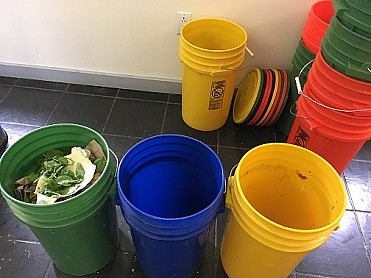May 8, 2018
Located in rural Northeastern Maryland, West Nottingham Academy (WNA) is the oldest private boarding and day school in the United States. Founded in 1744, WNA is a diverse and student-centered, school for young men and women, both undergraduate (9th through 12th grades) and post-graduate. The school has 130 students; 70 percent of students live on campus, and 30 percent attend as day students from surrounding counties. About 40 percent of the WNA student body come from countries outside of the United States.
West Nottingham Academy is a Maryland Association for Environmental and Outdoor Education (MAEOE) Certified Sustainable School, which means that the school has "made a commitment to developing stewards of the earth and reducing environmental impact." As part of this certification, WNA is developing a plan that incorporates sustainability into the physical campus, residential life, and the curriculum.
WNA students formed the Student Environmental Council (SEC) and the Green Team to engage fellow students in ideas of sustainability and environmental conservation. The SEC focuses on research, outdoor exploration, and activities that promote civic and community engagement. SEC strategies include involving students in meeting with local, state, and federal legislators, to discuss environmental laws and policies that affect WNA's community and beyond. The Green Team was formed for students involved in athletics, who cannot commit to the SEC as an after-school activity. Green Team members participate in field trips and events that support the on-campus initiatives of the SEC.
WNA is also a founding member of the Cecil County Conservation Partnership, a network of local conservation organizations. The school does an excellent job of promoting its Sustainability Programs and has a Sustainability Director, Virginia Kennedy, and an Environmental Sustainability Fellow, Amber Penaloza, to assist the SEC and help manage the school’s environmental efforts. Building environmental partnerships in the region has provided opportunities for educational, volunteer, and service learning collaborations for its students and faculty.
One such partnership is with Kilby Farm and Creamery, located just down the road from the WNA campus. Kilby Farm serves as an outdoor classroom for WNA students, and provides internship opportunities for students. The Farm has a methane digester for processing manure from its 600-cow dairy operation. Last year, Kilby Farm started accepting all of the food waste and soiled napkins from the WNA Dining Services to feed into its methane digester.
Students designed the food scrap collection program, developed promotion (with assistance from Kilby Farm), and provided training and ongoing monitoring of food scrap collection. Once per week the collected food scraps are transported by school staff and students and tipped into the digester.
The campus Dining Services purchases Kilby Farm milk and dairy products, promoting a school-to-farm closed-loop cycle. The Dining Services also does a great job of using reusable dishware, and bulk dispensers for all beverages, cereals, and similar items. Condiments are also contained in bulk dispensers. The school has been able to eliminate one trash dumpster from the campus through its waste reduction and food waste diversion actions.
The Kilby family has been in the dairy business for more than 100 years. In its popular Kilby Cream retail ice cream business, milk is packaged in refillable glass bottles. The Kilby family recently sold the 480-acre farm and Kilby Cream operations; however, the dairy business Kilby Cream and the digester are continuing to operate. The Kilby Farm digester has a capacity of 680,000 gallons. The resulting electricity generated from the digester meets about 50 percent of the farm’s total electricity requirement, powering the milking parlor and ice cream factory. The digestate from the digester is used as fertilizer on farm fields. The Kilbys are still active on the Farm and in the community.
Ultimately, the students involved with the school’s sustainability efforts are hoping to promote its Kilby Farm partnership as a model for food waste diversion for other rural and agricultural communities. The students are putting together a video to showcase the program. Stakeholder meetings are planned for this summer to discuss how the model can promote the use of farm-based digesters as a means to divert food scraps from schools and communities, providing a much needed revenue stream for farmers and building more sustainable communities.
By Athena Lee Bradley
NERC staff is working with Virginia Kennedy, Director of Sustainability Programs; Amber Penaloza, Mike Cairns Environmental Sustainability Fellow; Bill Kilby; and others, to help promote their partnership and to bring together stakeholders to strategize on ways to advance the model to benefit farms and rural communities. NERC is working on the project through its USDA funded Implementing Food Waste, Organics, and Manure Management in Rural Maryland Communities.




Comments (0)
Add a Comment